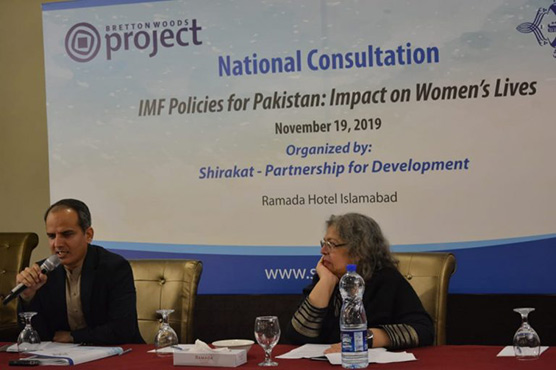Shirakat urges improvement in link between micro-economy policies and human capital development

Shirakat held the seminar in Islamabad.
(APP) – Shirakat – a non-governmental organisation working on human rights and women’s rights in Pakistan – on Tuesday organised a seminar entitled National Consultation on “Impact of International Monetary Fund (IMF) Policies on Women’s Lives in Pakistan” at Ramada Hotel in Islamabad.
The NGO’s representatives urged the concerned officials to improve linkages between the micro-economy and human capital development to elevate lifestyle of people belonging to lower income group.
Human rights leader and senior consultant at National Commission for Human Rights Dr Farkahnada Aurangzeb asserted that the government should allocate more resources to improve education, health and other social sector development for providing facilities to common people.
She said that that the global moneylender and the government should hold consultation with civil society to frame macroeconomic policies in favour of the general public.
Dr Farkahnada said that through socioeconomic policy formation process, there was a dire need to resolve issues of common people for providing them the opportunity to change their lives.
“Provision of better health, education and food facilities is a basic right of every citizen according to constitution of Pakistan.”
She urged participation of women in economic process to give them opportunity of achieving self-reliance in their lives.
Shirakat Executive Director Bilquis Tahira said: “In the times of economic recession, women and girls are being affected disproportionately and they have to cut down expenses which affect nutritional needs of girls and women”.
“There is a need to address women economic empowerment issues and for providing them facilities for education and health for their active role in society.”
Bilquis said that macro and microeconomic policies should be linked with the gender equality and empowerment to give economic liberty to the women.
Senior consultant of Ministry of Human Rights Muhmmad Arshad said: “Ensuring basic human rights is government’s priority […] the recent social protection programs including “Ehsaas” and “Kamyab Jawan” reflects government’s intentions to uplift women and girls, and provide favourable work opportunities to youths.”
He appreciated efforts of Shirakat to hold such consultations and urged to continue these discussions.
In panel discussion entitled “critical analysis of macroeconomic policies vis-à-vis social development” consisted of macro-economist and Sustainable Development Policy Institute (SDPI) Director Dr Sajid Amin said: “Macroeconomic policies should consider the social development aspect and forums like this will help understand the impacts in a better way from standpoint of common men and women.”
In concluding session, Shirakat announced to continue this forum and initiate network of organisations to bring together civil society and financial institutions in order to achieve gender equality and improve lives of women and girls in Pakistan.
This consultation was organised in partnership with Bretton Woods Project to channelise civil society input into the macroeconomic framework that IMF promotes, with a focus on the impact on women’s lives in Pakistan.
Shirakat will continue to hold these discussions in future and strengthen the role of civil society in highlighting the impacts of economic policies on women and girls.
Representatives from think tanks, national and international organisations, academia and economists attended the event.

